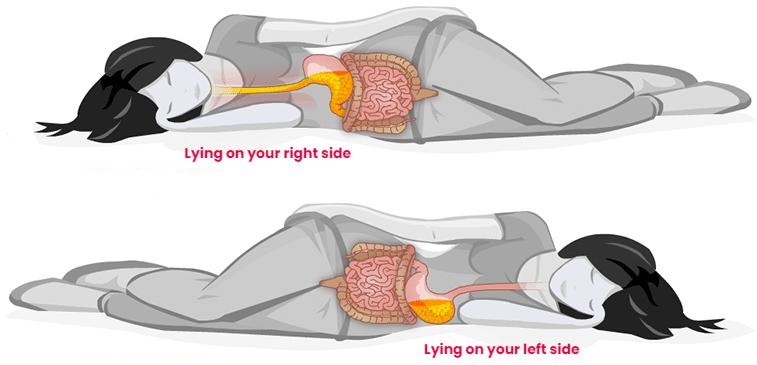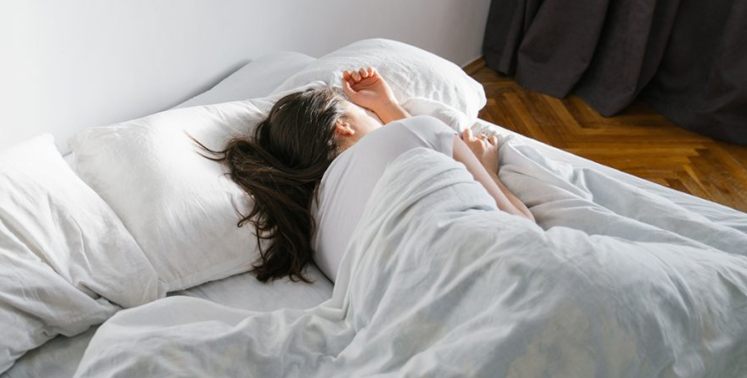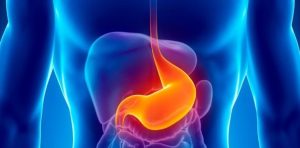If you have chronic acid reflux (GERD), you may need to make some lifestyle modifications to avoid the long-term consequences of untreated acid reflux, such as Barrett’s esophagus [1, 2, 3].
These modifications may involve avoiding certain foods such as; tomatoes and chocolate or abstaining from strenuous exercises such as; weight lifting and running.
According to studies and surveys, many GERD patients usually experience heartburn at night [4, 5, 6].
If you are one of them, you may also consider changing the way you sleep in order to prevent acid damage to the delicate lining of your esophagus.
Sleeping on the left side — as evident from the title of the article — is the ideal sleep position for acid reflux patients as this position helps reduce the risk of experiencing acid reflux symptoms while lying down.
Multiple research studies confirm that sleeping on the left side is the best sleep position for preventing nighttime heartburn. Below, we will review these studies indeed.
What is GERD?
Acid reflux occurs when stomach acid flows back up into the esophagus, in other words, food pipe [5].
Normally, a bundle of muscles at the lower end of the esophagus — known as the Lower Esophagal Sphincter (LES) — prevent stomach acid from moving upward.
However, LES sometimes malfunctions and doesn’t close properly. When it happens stomach acid can flow back up into the esophagus, causing symptoms, most commonly heartburn [6].
Everyone can experience acid reflux at some point in life and it is totally normal [7]. Yet, for some people, it happens too often and brings about symptoms, thus lowering the quality of life.
According to the Cleveland Clinic: Having heartburn twice a week over a period of several weeks may indicate GERD (Gastroesophageal Reflux Disease or Chronic Acid Reflux).
Studies Confirm: Sleeping on the Left Side Helps Avoid Nighttime Heartburn
Multiple studies found that sleeping on the left side is the most reliable sleep position to prevent nighttime heartburn.
Here are some of these studies and their findings…
In one study — published in the American Journal of Gastroenterology — researchers aimed to evaluate the effect of different sleep positions on gastroesophageal reflux. They found that sleeping on the left side is least likely to cause acid reflux symptoms and symptoms tend to be less severe when compared to back-sleeping and right-side sleeping.
In another study — appearing in the Journal of Clinical Gastroenterology — researchers compared left-side sleeping with right-side sleeping to see whether there is a difference in the amount of acid reflux. Results showed that the total amount of reflux time was significantly longer when the subjects sleep on their right side (231 min) than on their left side (117 min).
A more recent study found that sleeping on the left side while the head and torso are a couple of inches elevated, minimises the risk of having heartburn during sleep.
There are more studies on this topic, suggesting that sleeping on the left side lowers the risk of having nighttime heartburn whereas sleeping on the back and on the right can increase the risk [8, 9, 10, 11].
How Does Sleeping on Your Left Help Prevent Nighttime Heartburn?
While you are standing or sitting upright, gravity helps keep the stomach acid where it belongs.
When you are lying down, however, you lose gravity’s help in keeping gastric acid in the stomach. In that case, the only thing that prevents stomach acid from moving upward is LES — the valve-like muscle between the stomach and esophagus.
If LES doesn’t close properly when you lie down, stomach acid can easily flow into the esophagus. That is why nighttime heartburn is a common occurrence among people with acid reflux.
However, if you sleep on your left, gravity can still work in your favour and help prevent heartburn. This is explained by the shape of the stomach and the location of the junction point between the esophagus and stomach.
The image below mostly explains why sleeping on your left reduce the risk of having acid reflux while sleeping on your right set the stage for nighttime heartburn.

As you can see in the image when you lie on your left side; the meeting point between your stomach and food pipe (esophagus) tends to stay above the level of stomach acid.
This doesn’t mean that left-sleeping can completely prevent acid leakage. Yet, it can significantly reduce the total number of reflux episodes at night as well as the amount of acid that leaks to the esophagus. This is especially true if you don’t eat before going to bed.
Should I sleep on My Left Side to Prevent Acid Reflux?
If you constantly experience acid reflux symptoms, you may have developed GERD. For this reason, we highly recommend you work with your doctor to effectively combat this common digestive disorder. Your doctor will tell you whatever you need to know, including the most suitable sleep position for you.
However, on the basis of the available studies on this topic, it should be safe to say: Yes, you should consider sleeping on your left if you usually experience acid reflux symptoms when you lie down.
Other Potential Ways to Avoid Nighttime Heartburn
We came to the conclusion that sleeping on the left side can significantly reduce the risk of having heartburn while sleeping or attempting to sleep.
Here are other ways that may help prevent heartburn at night.
- Sleep Elevated: Studies suggest elevating the upper body and head preferably up to 6 to 8 inches while sleeping can lower the risk of acid leakage to the esophagus [12, 13, 14, 15].
- Avoid eating late: Eating close to bedtime can significantly increase the risk of heartburn while sleeping. So, Make sure you eat 3 to 4 hours before bed [13, 16]. Avoid late-night snacks as well that include even many healthy foods such as walnuts, bananas or avocados.
- Empty your mind: Try to reduce your stress before going to sleep as stress may aggravate acid reflux symptoms [17, 18, 19].
Summary
When it comes to acid reflux, patients should make necessary lifestyle modifications to avoid the consequences of untreated GERD. This may even involve changing their sleep positions.
As we discussed above, sleeping on the left side is the ideal sleep position to lower the risk of nighttime heartburn. And, many studies back up this statement.
Please do not forget that having heartburn at night does not only damage your food pipe but also disrupt your sleep and thus lower your quality of life significantly.
If you suscept you have developed GERD, work closely with your doctor. He/she will determine the underlying cause and apply the best treatment accordingly.
Our suggestion for now is:
- Avoid eating late
- Reduce stress
- Avoid heartburn triggering foods as much as possible
- Quit Smoking
- Sleep on your left
- Maintain Healthy Weight
- Eat enough fibre
- Take a walk sometime after eating
It bears repeating; long-term untreated GERD can lead to serious complications; So, do not forget to consult with your doctor to manage GERD.
Tarkan is an experienced health writer ( currently more than 600 articles ) and also the founder of this website namely www.neededforhealth.com. His expertise in health stems from in-depth medical research and knowledge which he obtained over the course of many years.
Tarkan enjoys sharing factual knowledge on health, psychology and nutrition. He always aims to deliver evidence-based recommendations, provide links to related scientific studies.





